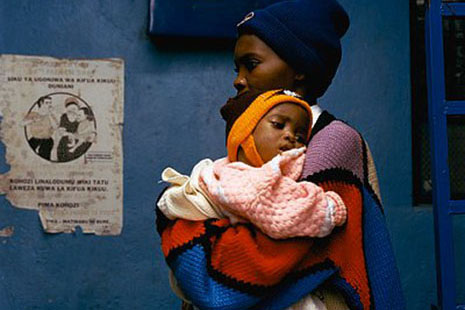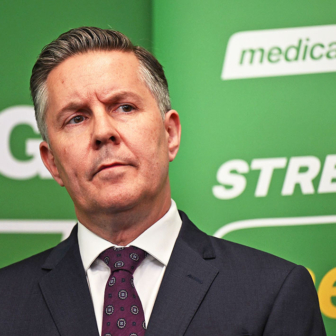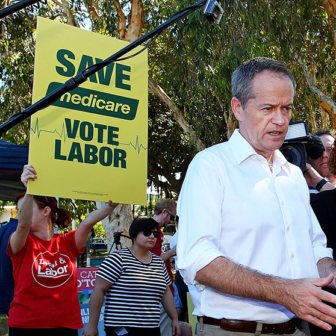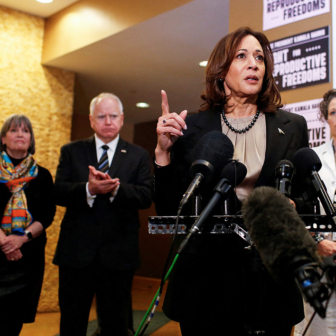JUST OFF the main road that slices through Mathare, one of the many slums dotted around the Kenyan capital, Nairobi, is a small clinic called the Blue House. Seated on low wooden benches outside the building, patients with white masks over their mouths are waiting to see a nurse or doctor.
Soon after I arrived at the clinic one recent Friday morning, a small, softly spoken woman called Margaret Njeri emerged from the dispensary. In a brown paper bag she carried two syringes and vials of medicine – her treatment for the weekend, when the clinic would be closed. Njeri suffers from tuberculosis, or TB, a disease that is relatively rare in the developed world but still a major killer in Africa and other low-income countries. She first contracted TB in 2005, she told me, and then again last year. Both times she stuck carefully to the treatment plan that has remained unchanged since the 1950s – an eight-month course of medicine, several pills a day. But now the disease has returned, leaving her so weak at one stage that she had to be carried to the clinic.
Njeri’s doctor at the Blue House, which is run by the international medical charity Médecins Sans Frontières, or MSF, has put her on a more drastic regimen that requires daily injections administered by a qualified nurse for two months.
“Why does the TB keep coming back?” asked Njeri, who is unemployed and has three children, when we talked in a spare office. “My adherence [to the drug program] has always been good.”
One reason may be Njeri’s infection with HIV, which has left her more susceptible to opportunistic infections. She is also being tested for a more virulent form of tuberculosis, known as multi-drug-resistant TB. But her struggle with disease also reflects a failure of modern medicine.
Despite claiming two million lives a year, TB remains a neglected disease – neglected, that is, by the major drug companies, collectively known as Big Pharma, which dominate the global industry. A hard-hitting editorial in the Lancet, the influential British medical journal, in May, noted that TB was more prevalent today than at any time in history. The major barrier to improved treatment, the magazine said, was the lack of investment by Big Pharma. Since TB is seen as a poor person’s disease, with low potential for profits, the companies see little point in investing in research and development.
“When it comes to tuberculosis, the pharmaceutical industry has broken its contract with global society time and time again,” the journal said. “With each day that industry fails to repair that contract, pharmaceutical companies share responsibility for the deaths of thousands of people who depend on new medicines for their survival.”
IN FEBRUARY 2009, GlaxoSmithKline, the world’s second-biggest pharmaceutical company, with profits of £9.3 billion last year, signalled that it was going to take the lead in changing the way Big Pharma operates. In a speech at Harvard University, chief executive Andrew Witty promised to cut the prices of GSK’s drugs in the forty-nine least-developed countries, or LDCs – as classified by the United Nations – to no more than 25 per cent of what it charges in Britain. Some middle-income countries, such as Brazil and India, would also see price reductions, he said. On 1 July this year, GSK followed up that announcement with the news that it had created a new dedicated business arm specifically for LDCs, to be known as the Developing Countries and Market Access operating unit.
Back in February last year the company also pledged to invest a fifth of the profits it earns in the poorest countries in local hospitals and health workers. In addition, independent scientists were to be invited to use GSK’s specialist facilities in Spain to conduct their own research into tropical diseases.
But the most radical announcement related to intellectual property and neglected diseases. Until then, Big Pharma had always been fiercely protective of its patents for medicines and molecular compounds – even where it meant denying the world’s poorest people essential medicines, as in the case of AIDS treatment.
Witty now said that his company would be placing in a “patent pool” – or “knowledge pool” in GSK-speak – around 800 of its protected chemicals and processes that might be useful in finding drugs for sixteen neglected diseases, as defined by the US Food and Drug Administration. These included TB, malaria and cholera – all major killers in the developing world. This pool would be open for use by outside researchers and institutions interested in developing new drugs to treat the diseases, though any benefits from the pool “must go in full and wholly to LDCs,” Witty stressed. Among campaigners for better access to essential medicine the announcement was seen as an open admission of Big Pharma’s failure to work on neglected diseases.
“I think it’s the first time anybody’s really come out and said we’re prepared to start talking to people about pooling our patents to try to facilitate innovation in areas where, so far, there hasn’t been much progress,” Witty told the Guardian newspaper at the time. “I can’t tell you how many speeches I’ve heard about – oh, you know – ‘I wish we could make progress on TB’ or ‘Why haven’t we got treatments for these things?’ We all sit there saying well, yes, it’s terrible isn’t it, instead of actually trying to do something about it. So… what I really hope this does is stimulate people to start engaging with us, and maybe other people to say look, actually, if you did it this way it could really work.”
News of the patent pool received a cautious welcome from campaigners who lobby for wider access to essential medicines. Part of the scepticism derived from an inherent mistrust of Big Pharma, given its record, but the lack of detail in the plan also left many questions.
Andy Gray, a senior lecturer at the Department of Therapeutics and Medicines Management at the Nelson R. Mandela School of Medicine in South Africa, told me that he thought GSK had got good PR out of the move – more than it merited at the time. “In the beginning my gut reaction was that GSK was not putting anything terribly valuable or close to market into the pool. Either it was a dead end or there was such a small market that there was not much money to be made.”
Over the ensuing months more details emerged of how the pool would operate and who would be involved. In July 2009, Alnylam Pharmaceuticals, a young US biotech company, announced that it was signing up. Alnylam’s primary focus is a technology known as “gene silencing,” which tackles the cause of diseases, and the firm said it was transferring to the pool 1500 of its issued or pending patents.
Six months later, GSK announced that BIO Ventures for Global Health, a non-profit organisation partly funded by the Bill and Melinda Gates Foundation, would administer the project. It also said that the Emory Institute for Drug Discovery, at Emory University in Atlanta, had joined the pool. So too had iThemba Pharmaceuticals, a private research and drug discovery company that is partly funded by the South African government and is dedicated to the development of new treatments for diseases such as HIV, TB and malaria. iThemba’s collaboration will focus mainly on TB.
The Massachusetts Institute of Technology joined the pool in May this year, adding some of its own patents – the first academic institution to do so. Also signing on was South Africa’s Technology Innovation Agency, in the process becoming the first government body to participate in the venture. The TIA hopes to assist other South African companies use the information in the pool.
Jon Pender, GSK’s head of government affairs, told me that discussions with research groups and universities after Witty’s speech at Harvard had shown that potential users of the patent pool wanted more access to the company’s expertise. “They said that they needed to talk to our scientists at a great level of detail if they were to get value,” he said.
As a result, GSK expanded its contribution to the neglected diseases pool to include “knowledge and know-how,” according to Pender. The initiative also acquired a new name: the Pool for Open Innovation against Neglected Tropical Diseases. “It’s been rapid progress,” Pender told me. “The pool is beginning to take on its own identity… it’s becoming independent.”
Some health experts have cautiously welcomed the developments in the pool over the past twelve months. Andy Gray said the involvement of the South African institutions was a positive move that could help if any of the compounds reached a stage where they had the potential to be taken to the market.
Christa Cepuch, director of programs at Health Action International Africa, part of a global organisation working to increase access to essential medicines, is positive about the move, too. I met her at the organisation’s office in a pleasant, tree-lined street; like many of the wealthier neighbourhoods in Nairobi, it borders an area of grinding poverty – in this case Kibera, the largest slum in East Africa.
Cepuch said that GSK’s decision to establish the patent pool was “potentially an important move” and “an acknowledgement by big drug companies for the first time that patents are a barrier for access to medicine.” She went on: “We need science to tackle these diseases. Look at TB – for diagnosis we use the same technology as has been used for fifty years, x-rays or smears. But for those who have HIV too, it’s not accurate. Then for the treatment you have at least three big pills a day for six to eight months.” If that fails, as in the case of Margaret Njeri in Nairobi, you need to go to a clinic for daily injections, “which can be devastating.”
Michelle Childs, director of policy and advocacy at MSF’s Campaign for Access to Essential Medicines, was less optimistic about the pool’s potential. “What GSK is saying is okay; we will let certain people test our compounds to see if there is benefit for diseases that we don’t look for. Once a promising molecule has been identified, will there be money and interest to develop it into something that people can use? At the moment, it’s just one major company with a limited set of compounds. If this was done across the industry it has the potential to have real benefits for research.”
There is also the time factor. Even GSK acknowledges that any tangible benefits of the pool will only be realised many years down the line – at least a decade from now, and probably more. And Gray, Cepuch and Childs all agree on the major shortcoming of the GSK patent pool – its exclusion of AIDS as one of the diseases to be tackled.
ON THE far side of the Blue House clinic in Mathare – the part dedicated to HIV-positive patients – stood Stephen Korir, a neatly dressed forty-two-year-old man. (His name has been changed at his request to protect his anonymity.) In the office where I’d spoken to Margaret Njeri, he told me his story.
In 2003, Korir’s wife was tested for HIV during her pregnancy. She was positive. So was Korir, as he soon found out, and so was their five-year-old daughter. Korir assumed they’d all soon be dead. He certainly never expected to see 2010. But modern medicine, in the form of antiretroviral drugs, has not only kept the family alive, it has enabled them to live mostly normal lives.
Big Pharma developed the basic antiretroviral medicines but that alone would not have been enough to save the Korirs. A decade ago, the prices charged by the drug giants for first-line treatment were so high – more than $10,000 a year per patient – that AIDS was still a death sentence in the developing world. It was only after pharmaceutical companies in countries like India and Brazil, in defiance of Big Pharma, began developing generic versions of the existing AIDS drugs and combined the best of them in powerful fixed-dose therapies, that treatment became affordable. In just a few years the cost of treatment plummeted to US$87 per patient per year – a price that allowed Western donors and local governments to expand treatment programs exponentially. In 2003 – the year the Korirs discovered their HIV status, only 400,000 people were receiving antiretroviral drugs around the world. By 2008, the figure had grown to four million.
Despite the dramatic progress, however, that figure only represents one-in-three adults and one-in-ten children who need treatment with life-saving drugs. And the burden will grow as infections continue; it is estimated that fifty-five million people will require treatment by 2030. Indeed, the challenges facing HIV patients in the coming years are so great that the UK parliamentary group on AIDS has described the situation as a “treatment timebomb.”
The $87 generic drug has been a life-saver for people like the Korirs. But it has strong side-effects and can be toxic to many users. Since 2006, the World Health Organization, or WHO, has recommended moving to an alternative, less toxic treatment that costs nearly three times as much – and often much more in countries where there is patent protection – so most poor countries have still not made the switch.
Since HIV is constantly mutating and acquiring resistance to medicine, many people living with HIV/AIDS, including Korir’s wife, need to move to more complex – and much more expensive – second-line and third-line drugs after a few years. At these higher prices HIV is once again threatening to become a death sentence for millions of people.
This is the next battle in the war against AIDS – one where health activists and Big Pharma companies such as GSK appear to be taking opposite sides.
THE IDEA of an industry-wide patent pool is not new. In 1856, the makers of sewing machines, including Singer – which survives today – were embroiled in a tussle over infringement of intellectual property rights in the United States. Rather than pursue costly legal action against each other, the companies decided to pool their patents voluntarily.
An equally famous case occurred half a century later, although this time it was the government pressuring private patent holders to work together. It was 1917, midway through the first world war. Aviation pioneers, including the Wright brothers, credited as the founders of modern flight, had through their patents effectively stopped new aeroplanes being built. The US government desperately needed aircraft for its war effort, and so forced the companies to form a patent pool, known as the Manufacturers Aircraft Association.
Now, nearly a century on, there is a strong push to establish a similar scheme for AIDS treatment. The idea is being pursued by Unitaid, an international organisation set up in 2006 by France, Chile, Brazil, Norway and Britain, which buys HIV/AIDS, malaria and TB drugs in bulk on behalf of poor countries. The premise of the scheme is simple. Nine Big Pharma companies will transfer their patents for new AIDS medicines – nineteen products have been identified – into a common pool administered by a foundation set up by Unitaid. Generic manufacturers will then be able to come to this new “one-stop shop” and acquire licences to use these patents to produce their own medicines – without having to negotiate with each major drug company separately. In return Big Pharma will receive royalty payments, which was often not the case when generic companies produced their first generation of medicines.
Unitaid, which is partly financed by an international micro-tax on airline tickets and is hosted by the WHO, says the pool will increase competition among generic manufacturers and sharply reduce the prices of new medicines, since these companies have much lower manufacturing costs than Big Pharma. Crucially, it should also spur the development of fixed-dose combinations and paediatric medicines, areas where generic companies have traditionally taken the lead. And because the patents are for finished products – not compounds as with the GSK pool – the time to bring a new medicine to market will be short.
Advocates of the scheme, who include the British government and virtually all the AIDS campaign groups, say the pool is crucial if the next round of challenges in treatment is to be overcome. They point out the crucial role of generic companies in expanding tenfold the number of people receiving antiretrovirals between 2003 and 2008.
The most widely used first-line treatment in Africa is a generic combination made by the Indian firm Cipla and known as Triomune, which combines Lamivudine, Stavudine and Nevirapine – each developed by a different large drug company – into a single pill. At $87, it costs 1 per cent of the price of first-line treatment a decade ago, when patients had to take a handful of pills a day.
“Triomune was revolutionary,” Ellen ’t Hoen, a senior adviser on intellectual property at Unitaid told me. “One pill in the morning and one in the evening. Easy for the patient, and for logistics. The big companies could have come together to cross-license [and produce a similar fixed-dose combination].” But it is generic companies who do most of the innovation with regard to formulation, and who have the economies of scale, Hoen said.
By 2015, 18.6 million people in the developing world will need AIDS treatment if an 80 per cent coverage rate – the internationally agreed universal access target – is to be met. But while most donors are keeping funding static because of the global financial problems, the cost of treating the disease, both for each patient and in total, is about to increase significantly. For newer medicines the big pharmaceutical companies have moved to protect themselves by taking out patents even in poor countries, making generic competition difficult. The Indian government’s decision to bow to World Trade Organization rules and allow pharmaceutical product patents for the first time has also had a detrimental effect.
The WHO-recommended alternative to Triomune as a first-line treatment increases the cost per person from US$87 to $217, at best, a year. The cheapest generic second-line treatment is at least $475 per year – and much more in countries where patent barriers exist. Third-line treatments cost $2000 or more. At those prices, Hoen says, AIDS treatment for most people in the poorest countries is simply “not going to happen.”
The Unitaid patent pool is still a work in progress. A legal entity to run the pool is expected to be established this month and negotiations with Big Pharma should be completed by the end of 2010. Hoen says that several companies have responded positively, including Gilead, Merck and Tibotec/Johnson & Johnson. (The others targeted by Unitaid are Abbott, Boehringer Ingelheim, Bristol-Myers Squibb and Roche, as well as Pfizer and GSK, which have merged their HIV/AIDS operations into a new company called ViiV.)
But GSK has shown little interest in the Unitaid patent pool. Jon Pender said that unlike TB and malaria, which are included in the GSK pool, HIV/AIDS is not a neglected disease, with industry-wide spending on research topping US$1 billion a year. (Ellen ’t Hoen described this as “a funny argument. Yes, there’s research going on, but it’s not in public and the results are not available in the developing world.”)
Pender said GSK’s approach to voluntary licensing to generic manufacturers was already “very progressive.” He also rejected the argument that the Unitaid patent pool would help the development of new fixed-dose combination drugs if the patents of all the Big Pharma companies were easily accessible in one place. “Many of our licensees have similar licences from different companies – so there’s nothing stopping them developing new fixed-dose formulations already. In effect that’s the situation now.”
He added that the price of first-line drugs, which has enabled millions of people to stay alive, was in fact too low to make business sense. “To achieve $80 a year you need huge quantities, and three-year contracts. The generic companies say it is not sustainable.” He said that while the cost of second- and third-line drugs “is a concern,” the prices would come down as volumes increased.
But GSK’s stance causes much anger among AIDS treatment campaigners. Cepuch said: “Clearly there’s a need for lower prices, better first-line treatment and better children’s medicine, which the Unitaid patent pool will help achieve. GSK’S argument is not acceptable. It’s just to protect profits.”
Nelson Otwoma, the coordinator of the National Empowerment Network of People Living with HIV/AIDS in Kenya, is an alternate member of the Unitaid board, representing communities affected by AIDS, TB and malaria. He told me that there was a feeling among some Unitaid members that GSK had tried to “pull the carpet from beneath our feet” by setting up its own patent pool for neglected diseases.
HIV-positive himself, he has seen the positive effect of generic drugs. When his nine-year-old son started receiving treatment it was necessary to crush up adult pills based on the weight of the child to achieve the correct formulation. Now there is a single pill, specifically for children, developed by a generic manufacturer.
The lower cost of treatment has drastically increased the number of Kenyans receiving antiretroviral drugs to 360,000 – out of the 600,000 people who need them – virtually all financed by foreign donors. But with the WHO now recommending that people start receiving treatment when their CD4 counts – an indicator of the advancement of the disease – fall to 350, rather than 200 as before, the number of needy people rises to more than one million.
Otwoma, whose own CD4 count is around 350, should be starting to receive treatment under the more expensive WHO-recommended first-line treatment. But he is not. “In Kenya we cannot move to the new drugs because we are too poor,” he said.
THOUGH it left HIV/AIDS out of its own patent pool, GSK did announce new initiatives on HIV/AIDS treatment in 2009. During a trip to Kenya, Witty announced that £50 million had been set aside for the ten-year Positive Action for Children Fund, which will disburse the money to charities and other groups that work to prevent mother-to-child transmission of HIV and also help orphans and vulnerable children. Pender said that there had been a call for funding proposals from organisations in March this year, and a decision on the first beneficiaries could be made this month. A £10 million public-private partnership to fund research into new AIDS medicines for children, also set up last year, had seen “real progress,” according to Pender, though he said he was not able to provide any more details at this time.
When I asked him about the promise to reduce prices in the Least Developed Countries, Pender referred me to GSK’s latest corporate responsibility report. Published in March this year, the report says that in April 2009 GSK cut the price of eleven patented brands – from Avamys, a rhinitis treatment, to Zeffix, for hepatitis B – in least-developed countries to less than 25 per cent of the price of the same drugs in Britain. The average price cut was 45 per cent.
“We know that these products may not meet the priority health needs of the general population in LDCs, but we have started by reducing the price of products where there is a lack of competition and we are the only supplier,” the report said.
Sales for some of the products had increased up to eightfold in the last quarter of 2009, compared to the first quarter. But for other brands sales were flat or had even decreased – as was the case for the malaria drug Malarone, which was rebranded to Malanil for regulatory reasons, leading some potential customers to suspect it was fake.
Despite GSK’s trumpeting of the price cuts, campaigners have played down the significance of the moves. Michelle Childs of MSF points out that while cutting the prices to 25 per cent of developed world prices might seem a lot, they are still unaffordable to most people in the poorest countries. “As we saw with HIV medicines, it was only when the price came down by 99 per cent in LDCs that they became affordable. The solution that GSK is putting forward is for them to control the price. It’s competition among generic companies that drives down prices.”
Andy Gray agrees. He is deeply suspicious of Big Pharma’s claims to sell drugs at what they say is at or near production cost. “GSK has cut the prices of many of its medicines largely in response to generic competition. Each time they claim the price is at a not-for-profit level. But then there are subsequent cuts, which they put down to efficiencies. It’s very difficult to prove because there is no transparency. GSK is not alone in this.”
Another criticism is that countries like Kenya, where nearly half the population lives below the poverty line, have been left out of the GSK price-cut scheme because they are not classified as “least developed.” (GSK does supply its AIDS medicines and vaccines at not-for-profit prices in poor countries, including Kenya.) Instead, they only benefit from one-off moves, like GSK’s decision last year to cut the prices of the antibiotics Augmentin and Zinnat by 40 per cent and 30 per cent in east Africa. The official announcement was made at an event attended by senior government health officials and received favourable media coverage in Kenya – to the bemusement of groups like Health Action International Africa.
The group wrote a letter to the East African newspaper pointing out that Zinnat was not an “essential medicine” and thus any price reduction was of limited importance to most Kenyans. And while Augmentin is listed as “essential” by the WHO, it has generic equivalents that are more often used in public hospitals. “Even if these GSK medicines were of crucial importance to Kenyans, generic competition would drive down prices much further than GSK’s new offer…” the letter stated.
Cepuch, one of the signatories to the letter, added: “The whole fanfare about this antibiotic announcement was beyond us. Just doing specific price reductions does not have much effect on public health.”
OTHER developments on Witty’s promises have been less contentious. In January GSK announced that it had established its first ever “Open Lab” to serve as “an engine room of scientific innovation for neglected tropical diseases.” Up to sixty scientists from around the world will have access to the company’s facilities in Tres Cantos, Spain, which are used for research and development of medicines for diseases found mainly in low-income countries. Visiting scientists will be able to tap into the company’s expertise – 110 GSK staff work on site, mostly on TB and malaria – while pursuing their own projects. All intellectual property created will remain with the visiting researchers. The company has contributed an initial US$8 million in funding for the new research programs.
There have also been several announcements related to malaria, for which GSK has been working on a vaccine over more than two decades. Large-scale trials on a vaccine for African children began last year, and the company hopes to submit the drug to regulators by 2012. While the cost of the vaccine has not yet been calculated, GSK has pledged that it will limit its profit margin to 5 per cent, and then reinvest that profit in developing other malaria vaccines.
Separately, GSK announced this year that it was going to share data and chemical structures that were identified during a year-long screening of the malaria parasite against two million of the company’s compounds. By May, details of the more than 13,500 compounds that had showed some sort of activity against the parasite had been placed on public websites for anyone to use. In its press release the company said that “scientists globally have been given thousands of chemical starting points to stimulate their research into this deadly disease which kills one child in Africa every 30 seconds.”
As with the GSK patent pool, however, any benefits will only be realised in the long term. “It will take many, many years before anything that comes out of these compounds even gets to a human for the first time,” Pender said.
But people like Margaret Njeri, who is battling both TB and AIDS, do not have the luxury of time. “Even now, I’m so scared,” she told me, referring to the possibility that she has drug-resistant TB. “Life is so difficult, I cannot work. All the same, we try…” •




